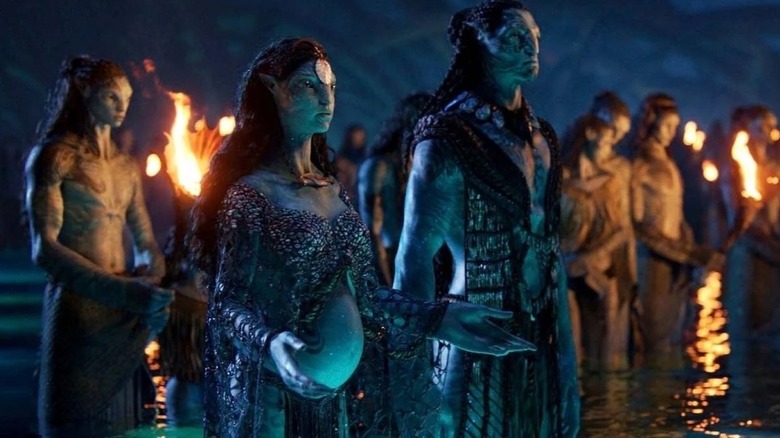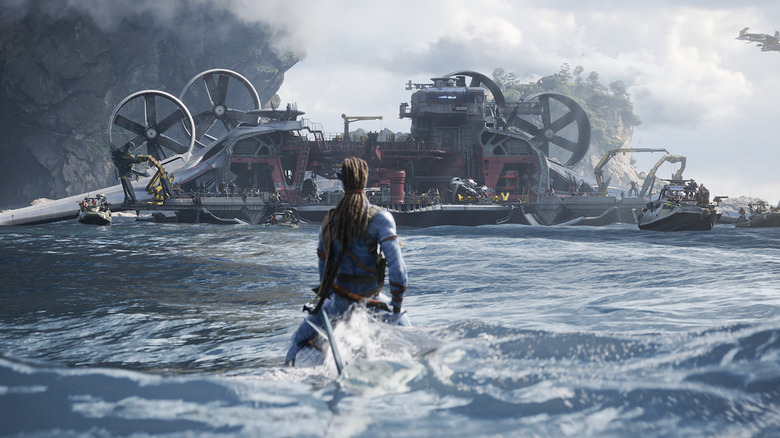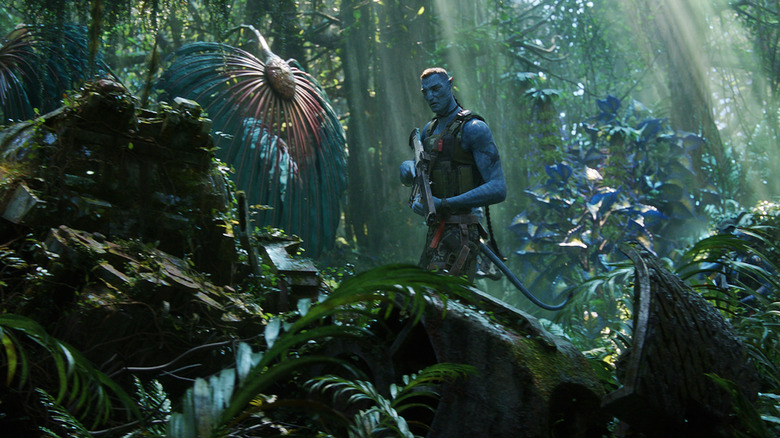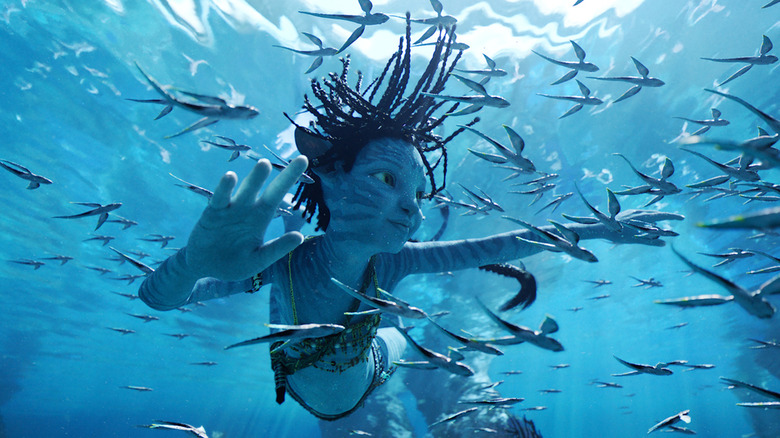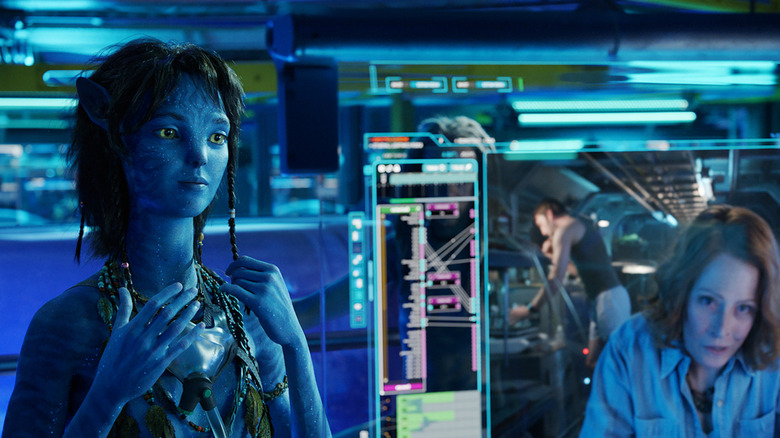Avatar: The Way Of Water Is The Culmination Of Every James Cameron Obsession
40 years ago, James Cameron made his directorial debut with "Piranha II: The Spawning." Kind of. The then 28-year-old filmmaker found himself dealing with a hostile producer (Ovidio G. Assonitis) and an Italian crew that did not speak English. It's unclear how much of the film Cameron actually directed or edited (one version of the story holds that Assonitis fired him before the end of the shoot; another claims he was barred from the editing room), but lurking within this horrid sequel to Joe Dante's surprisingly nifty rip-off of "Jaws" is the germ of a theme Cameron would chew on for the rest of his career. The piranha in his film are winged mutations bred to be used as biological weapons. This, of course, backfires on the scientists, and wreaks havoc on humanity and ecology in general.
If Cameron's next eight films have taught us anything about his worldview, it's that he abhors humankind's reckless mistreatment of the planet we inhabit. He's also not a big fan of how we treat one another. He is, however, endlessly fascinated with the cutting-edge technology we develop and, ultimately, use to catastrophically destructive ends. He loves weaponry. He stages violence with awesome inventiveness and invigorating elan. He has played a pivotal role in pioneering visual effects and immersive formats to captivate audiences with his cathartically violent films.
Cameron is aware of his contradictory nature. He once called "Terminator 2: Judgment Day" "a violent movie about peace." And, to be fair, he's made non-action films where violence is a periphery consideration if entirely non-existent. Those movies tend to spend a good deal of time underwater.
All of these concerns and obsessions collide to bold, brilliant effect in Cameron's ninth motion picture, "Avatar: The Way of Water." The sequel to the highest grossing film of all time (worldwide) is the director's first film in 13 years, and aside from a slightly choppy opening that catches us up with the family building efforts of Jake Sully (Sam Worthington) and Neytiri (Zoe Saldaña), he shows nary a sign of rust. Indeed, he's never been in firmer command of his craft — nor has he been angrier about the state of the world. This is the ne plus ultra of James Cameron's cinema, and it will have people chatting and arguing for years to come.
No time for jarheads
In the 13 years since "Avatar," the state of our world has worsened considerably: fascism is on the rise all over the globe; a manmade climate crisis looms distressingly close on the horizon; and Russia's unprovoked invasion of Ukraine has revived the apocalyptic threat of nuclear war. We're in a bad way, and, judging from the state of play on Pandora, Cameron is mighty pissed about it.
The director has been accused of preachiness in the past (e.g. the expanded Special Edition of "The Abyss" concludes with the waterbound aliens threatening Earth's coastal cities with annihilation if the planet's superpowers don't completely dismantle their nuclear arsenals), but these are decidedly unsubtle times. In "The Way of Water," Jake's former Marine cohorts, led by the vicious Colonel Quaritch (Stephen Lang), have been cloned as Na'vi, meaning they can freely breathe Pandora's air as they resume their brutal colonization efforts. The "hooah" bravado of Quaritch and his soldiers loudly echoes the jarhead camaraderie of the troops in "Aliens," only this time we really hate these guys. They're as charming as Sgt. Barnes' barbaric contingent in "Platoon," and just as gleeful in their perpetration of war crimes.
Cameron's portrayal of the military in "The Way of Water" isn't exactly an about-face. The Marines in "Aliens" might've come on as capable s***kickers, but their state-of-the-art firepower is no match for the acid-blooded xenomorphs, which slaughter them with comical ease. Cameron's even less impressed with the elite SEAL team in "The Abyss." Their high-handed treatment of the blue-collar Deep Core team evokes audience contempt, while the paranoid Coffey (Michael Bienh) gradually emerges as one of Cameron's most despicable villains (even though his psychotic actions are attributable in part to high-pressure nervous syndrome).
Cameron distrusts armed authority figures in general. The cops in "The Terminator" and "Terminator 2: Judgment Day" are cocky idiots who pay for their arrogance in blood (while Robert Patrick's T-1000 is the fearsome, dead-hearted embodiment of fascist law enforcement). His only semi-positive depiction of crime fighting comes in "True Lies," a project that did not originate with Cameron (it's based on the French action-comedy "Le Totale!"). This is Cameron scratching that Bond-movie itch that every member of his filmmaking generation possesses.
Cameron's been working up to this villainous portrayal of the U.S. military for most of his career, but it's still shocking to see him go so hard at the troops when Americans are conditioned/brainwashed to "support" our alleged defenders of democracy. The difference here is the timing: "Avatar" was written in the 1990s, when the shame of Vietnam had grown faint after the pyrrhic triumph of the Gulf War. "The Way of Water" has abuses like Abu Ghraib and worse on its mind. The scene where Quaritch tortures a tribe of reef people as a means of learning the Sully clan's whereabouts is the kind of pragmatic savagery visited on innocent people in every war (as is the subsequent burning of the village when the people prove legitimately ignorant).
The plundering of Pandora
The inhumanity of science gets significant play in the middle section of the movie, as we observe Dr. Ian Garvin (Jemaine Clement) coldly explaining his participation in the slaughter of the Tulkuns. They murder and mine these magnificent creatures' brains for pharmaceutical benefit, which Garvin does willingly while expressing empty-souled regret about his job. "This is why I drink," he quips.
Garvin's melancholy is not at all evident in Mick Scoresby (Brendan Cowell), a whaler who glories in the chase and eventual harpooning of Tulkuns. There are shades of Ahab in Scoresby, but you get the sense he's never had to work anywhere near that hard to land his prey. He's got all manner of submersibles at his disposal, and tracking technology that, when shot into a Tulkun, is just about impossible to extract. He'd probably be right at home with the dolphin-killing scum of Louie Psihoyos' devastating 2009 documentary "The Cove."
Intriguingly, "The Way of Water" finds Cameron pining away for a somewhat of a luddite lifestyle. As in "Avatar," Cameron is advocating for a more meaningful connection with the natural world. The Pandorans prioritize the preservation of their surroundings. It's better living through ecological harmony, and, if we're being honest with ourselves (and paying attention to climate experts), there's little doubt that de-industrialization is a must. This isn't entirely contradictory for Cameron. Near as I can tell, his obsession with exploring the deepest, darkest reaches of our oceans hasn't prompted him to create environmentally ruinous submersibles. Sure, there's a sense of rich-dude self-indulgence at play, but at least he shares his findings with the public à la Jacques Cousteau.
And while we're talking about the ocean...
Plunging headlong back into The Abyss
Perhaps "The Way of Water" is a more resonant film than its predecessor because it led Cameron back to his favorite habitat on the planet. I still consider the theatrical cut of "The Abyss" to be his finest work, but that film milks our fear of the deep for maximum suspense. We're out of our element down there, and, thanks in no small part to Steven Spielberg's "Jaws," we're terrified of a fatal encounter with a great white shark or some such toothy leviathan.
The most terrifying moment of "The Abyss" – and, for my money, one of the most intense moments in film history — finds Bud Brigman (Ed Harris) and his estranged wife, Lindsey (Mary Elizabeth Mastrantonio) trapped in a leaking submersible, with one operable diving suit, perilously far away from Deep Core. They run the numbers, and realize there's no chance they're both making it back to the base alive. After a briefly anguished debate, Lindsey convinces Bud to let her drown in the hopes that her hyperthermal state will preserve her long enough to be revived via CPR.
This scene is mimicked in a masterfully crosscut sequence in "The Way of Water." Jake and his second-oldest son, Lo'ak (Britain Dalton), are about to be engulfed in the whaling vessel, while, elsewhere on the ship, Neytiri and her youngest daughter, Tuk (Trinity Jo-Li Bliss), are about to meet the same fate. Rather than play out the dire drama of the Brigmans, Lo'ak calms his panicked father and convinces him that they can swim to the surface, which they do with the help of Payakan. Neytiri and Tuk seem less likely to survive, but the resourceful Kiri (Sigourney Weaver) enlists the aid of a sea creature to take them to safety.
Save Pandora, save the Earth
It's fitting that Cameron would return to the film that jeopardized the future of his career to save these characters we've come to love over three wondrously immersive hours. In "The Abyss," Bud saves his marriage by donning a suit filled with liquid oxygen to save the lives of his crew. Is this humanly possible? I've no clue, but I took that leap of faith because I trusted that a man as curious and meticulous as Cameron had given the situation far more thought than I ever could.
"The Way of Water" offers a different proposition. It asks us to take the logistics of these rescues, carried out on a planet far away from our own, on faith. It's magical thinking. It's James Cameron, a man of science and practicality, asking us to believe that we're capable of unimaginably great things if we engage with nature instead of wreck it for short-term, unsustainable comfort.
Cameron's been radicalized. He's obsessed with saving the planet. As ever, I'm not betting against him.
